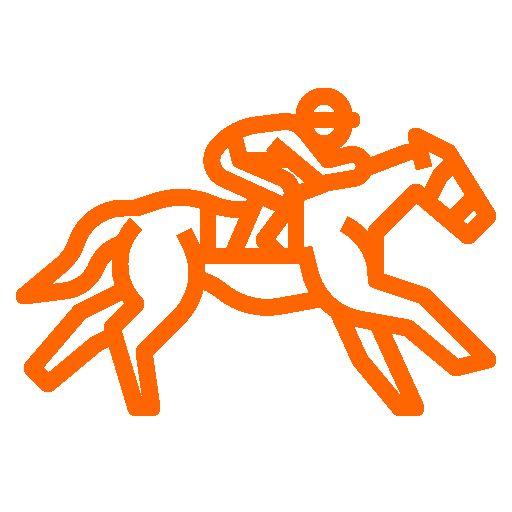Glossary G-J
G
Group / Graded races
These races form the upper tier of the racing structure, with Group/Grade 1 the most important, followed by Group/Grade 2 and Group/Grade 3. Group races are run on the Flat; Graded races are run over jumps (the most important Flat races in the United States are also Graded).
Guineas (currency)
A guinea was one pound and one shilling (£1.05 in decimal currency) and, traditionally, the prices of horses sold at public auction were given in guineas. Some sales companies still use guineas, though most have changed to pounds.
Guineas (race)
Shorthand for the 1,000 Guineas and/or 2,000 Guineas. A ‘Guineas horse’ is one that is considered capable of running in one of these Classic races.
Gallop
Top gait for a horse – the speed they race at.
Gallops
Training ground where horses are exercised. The major training centres in Britain are Newmarket and Malton (mostly Flat), and Lambourn (mostly Jump) with the Curragh in Ireland. Many trainers have private gallops of their own.
GamCare
The national centre for information, advice and practical help with regard to the social impact of gambling.
Gates
The front section of the starting stalls, which open at the start of a Flat race to release the horses. Used as another term for starting stalls.
Gelding
A male horse that has been castrated. Most male horses that compete over jumps have been gelded, and a Flat horse may be gelded. Geldings are not allowed to run in some of the top Flat races, such as the Derby, that are important for identifying potential breeding talent.
General Stud Book
Register of all thoroughbred horses, maintained by Weatherbys.
Get the trip
To stay the distance.
Going
The condition of the racing surface. Ranges from heavy to firm.
Going down
When horses are on their way to the start.
Go through the card
To have the winner of every race at a race meeting, either as a trainer, jockey, tipster or punter.
Green
Used to describe an immature or inexperienced horse.
Group 1 (Flat) / Grade 1 (jumps)
The highest category of race. The Classic Flat races in Britain, as well as other historic races such as the Gold Cup at Royal Ascot, are Group 1. The major championship races over jumps, such as the Cheltenham Gold Cup, are Grade 1.
H
Hacked up
Describes a horse winning easily.
Half-brother/sister
When two horses have the same mother (dam), they are half-brothers/sisters. Horses are not referred to as half-brothers/sisters when they share only the same father (sire).
Handicap
A race where each horse is allotted a different weight to carry, according to the official handicap ratings determined by the BHA Handicappers. The theory is that all horses run on a fair and equal basis – the ‘perfect’ handicap being one where all the runners finish in a dead-heat.
Handicap mark / Rating
Each horse, once it has run a few times (usually three), is allocated an official handicap rating by the BHA, which is used to determine its weight if it runs in a handicap. If a horse does well, its handicap rating will go up; if it performs poorly, its rating will go down.
Handicapper
Official responsible for allocating a handicap rating to each horse that has qualified for one, and for allotting the weights to be carried by each horse in a handicap. Employed by the British Horseracing Authority.
Hard ridden
Used to describe a horse whose jockey is expending full effort on the horse, and using his whip.
Headquarters
Newmarket, traditionally seen as the home of Flat racing, is often called Headquarters.
Home straight
The length of straight track, from the final bend to the finish line.
Hurdler
A horse that races over hurdles, which are lighter and lower than fences.
Hurdles
The smaller obstacles on a jumps course. Horses usually have a season or two over hurdles before progressing to fences, though some continue to specialise in hurdling and never run over fences, while some horses go straight over fences without trying hurdles first.
I
IBAS
Independent Arbitration Betting Service. An arbitration service that deals with betting disputes between punters and bookmakers.
In running
Refers to events that take place during the course of a race.
In-running betting
Betting on the outcome of a race during the race itself, rather than beforehand. This type of betting is particularly popular on the betting exchanges, though it is also offered by many bookmakers. In-running odds can change rapidly as the race unfolds.
J
Juvenile
A two-year-old horse. Every horse officially turns two on January 1, at the start of the second full calendar year following its birth e.g. a horse born in 2010 will turn two on January 1, 2012.
Juvenile hurdler
The youngest category of hurdler – juvenile hurdlers are those that turn four years of age (on January 1) during the season in which they start hurdling.
Jackpot
The Jackpot is a tote bet that requires the selection of the winners of the first six races at a selected meeting. The minimum bet is 50p
Jocked off
Term used to refer to when one jockey is replaced by another on a horse he usually rides or for which he has already been booked to ride in a particular race.
Joint-favourite
If two horses have the shortest odds in the betting, they are described as joint-favourites; if three or more horses have the shortest odds, they are co-favourites.
Judge
Racecourse official responsible for declaring the finishing order of a race and the distances between the runners.















